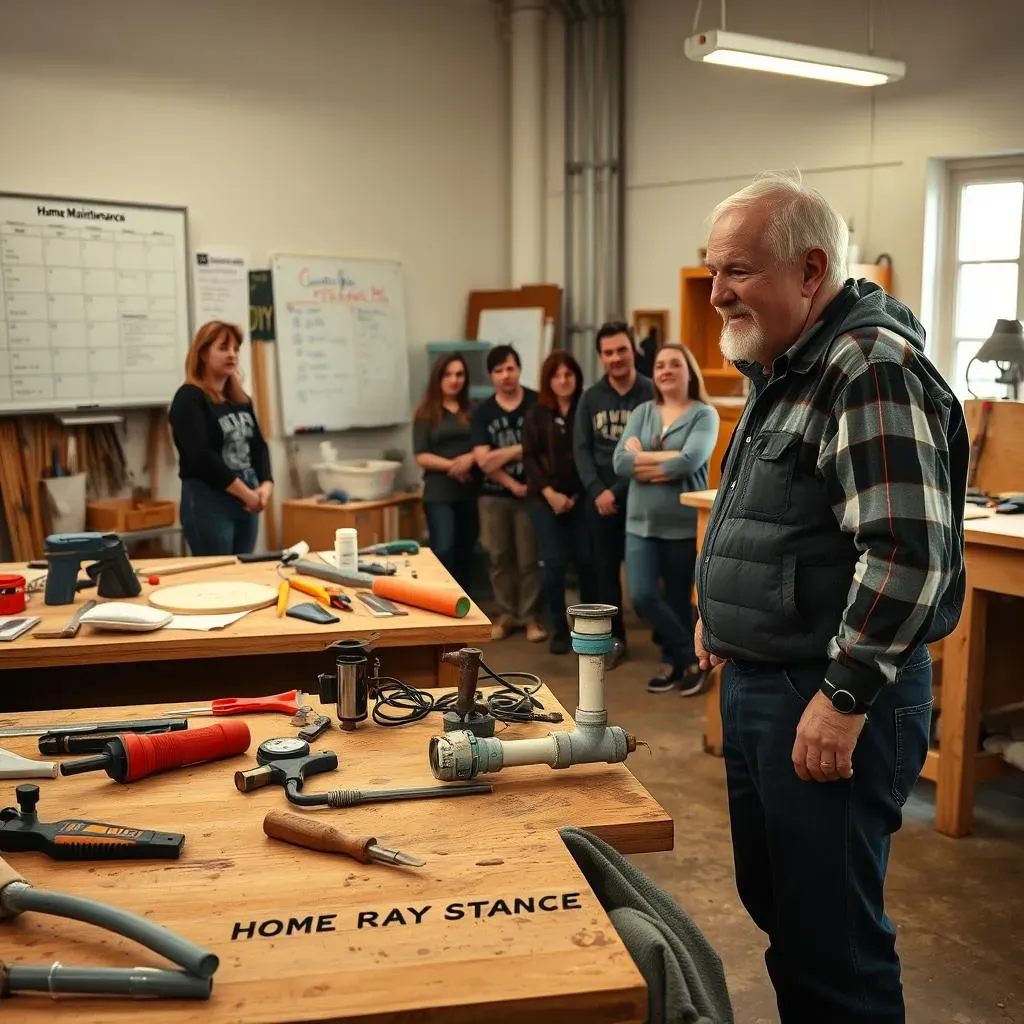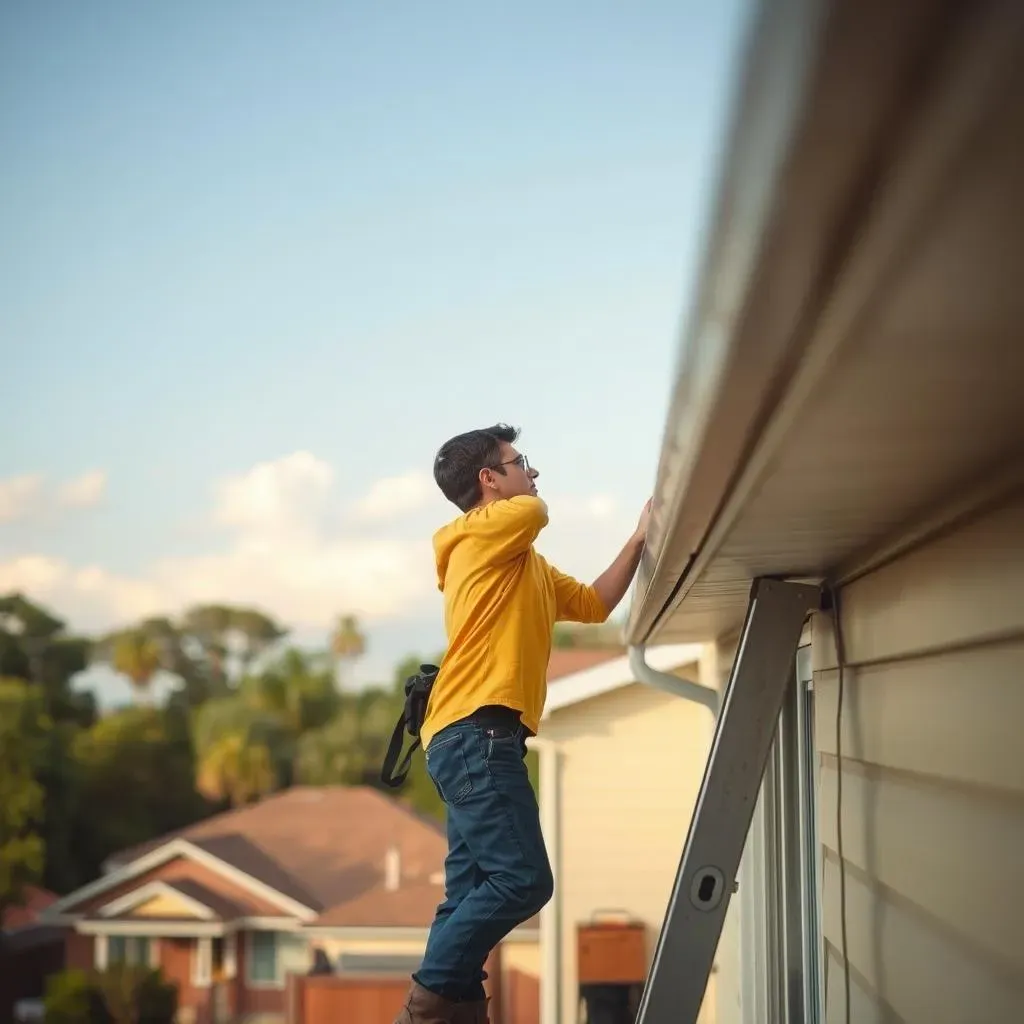Table of Contents
Are you tired of those nagging home repairs piling up? Do leaky faucets and flickering lights send shivers down your spine? Then it's time to ditch the fear and embrace the power of DIY! This article is your ultimate guide to navigating the world of home maintenance classes. We'll explore how to find the perfect class tailored to your needs, covering everything from basic plumbing fixes to more advanced carpentry skills. We'll uncover the essential home maintenance skills you'll master in these classes, equipping you to tackle those pesky DIY projects with confidence. But learning doesn't stop in the classroom! We'll also share practical tips and tricks for maintaining your home between classes, ensuring you're always one step ahead of any potential issues. Finally, we'll highlight the incredible benefits of investing in your DIY skills – saving you money, increasing your home's value, and giving you a tremendous sense of accomplishment. So, are you ready to transform from a home maintenance novice to a confident DIY expert? Let's dive into the exciting world of home maintenance classes and unlock your inner handyman or handywoman!
Finding the Right Home Maintenance Classes for You
Finding the Right Home Maintenance Classes for You
Consider Your Skill Level
Before you even start searching, honestly assess your current DIY skills. Are you a complete beginner, or do you have some experience with basic repairs? Many classes cater to different skill levels, from absolute newbies to those wanting to refine existing skills. Jumping into a class too advanced could be frustrating, while a class too basic might be a waste of your time and money. Be realistic about your abilities, and choose a class that matches your current expertise.
Think of it like learning a musical instrument. You wouldn't try to play a concerto on the violin without first learning the basics, would you? Start with the fundamentals, build a solid foundation, and then you can progress to more challenging projects and classes.
Skill Level | Class Type | Example Topics |
|---|---|---|
Beginner | Introductory Home Repair | Basic plumbing, painting, minor electrical work |
Intermediate | Advanced DIY Techniques | Drywall repair, tiling, simple carpentry |
Advanced | Specialized Home Improvement | Plumbing system overhaul, electrical wiring, major renovations |
Choosing the Right Format and Location
Home maintenance classes come in various formats – in-person, online, or even hybrid options combining both. In-person classes offer hands-on learning and direct interaction with instructors and fellow students. Online classes provide flexibility and convenience, allowing you to learn at your own pace, but lack the immediate feedback of an in-person setting. Think about your learning style and preferences. Do you thrive in a hands-on environment, or do you prefer the self-directed approach of online learning? Also consider the location; a local class might be more convenient, but an online class opens up a wider range of instructors and options.
Consider the time commitment as well. Some classes are intensive weekend workshops, while others are spread out over several weeks or months. Choose a format and schedule that fits your lifestyle and commitments. Don't overwhelm yourself with a class that demands too much of your time.
- In-person classes: Hands-on learning, immediate feedback, community interaction.
- Online classes: Flexibility, convenience, self-paced learning.
- Hybrid classes: Blends the best of both worlds, offering a balance of flexibility and hands-on experience.
Researching Instructors and Class Content
Don't just sign up for the first class you see! Take the time to research different instructors and their teaching styles. Look for reviews and testimonials from past students. A good instructor should be knowledgeable, patient, and able to explain complex concepts in a clear and understandable way. Also, carefully examine the class curriculum. Does it cover the topics you're interested in learning? Are the projects challenging yet achievable? A well-structured curriculum will provide a solid foundation in home maintenance skills. Check if the class includes hands-on practice, demonstrations, and opportunities for questions and feedback.
Remember, you’re investing your time and money. Make sure you choose a class that's a good fit for your learning style and goals. Don't be afraid to ask questions before enrolling. A reputable instructor will be happy to answer your questions and provide more information about the class.
"The best teachers teach from the heart, not from the book." - Unknown
Essential Home Maintenance Skills Taught in Classes
Essential Home Maintenance Skills Taught in Classes
Plumbing Basics
Many home maintenance classes start with the fundamentals of plumbing. You'll learn how to handle those annoying drips and minor leaks, the art of unclogging drains (without resorting to drastic measures!), and maybe even how to replace a simple faucet washer. It's empowering to know you can tackle these common issues yourself instead of calling a pricey plumber every time something goes wrong. Think of the money you'll save!
These classes usually cover basic tools, safety procedures, and common plumbing problems. You'll get hands-on practice, often working on mock-ups or even real-life fixtures. The satisfaction of fixing a leaky faucet yourself is unparalleled. It's a small victory, sure, but it's a victory nonetheless, and it builds your confidence for tackling more complex tasks.
Skill | Description | Tools |
|---|---|---|
Fixing Leaky Faucets | Replacing washers, tightening connections | Screwdrivers, pliers, wrench |
Unclogging Drains | Using plungers, drain snakes, chemical drain cleaners | Plunger, drain snake, rubber gloves |
Toilet Repair | Fixing running toilets, replacing fill valves | Screwdrivers, pliers, toilet repair kit |
Electrical Safety and Repairs
Electricity can be dangerous, so this is a crucial area covered in many home maintenance classes. You’ll learn about electrical safety, how to identify and avoid potential hazards, and how to handle simple electrical repairs. This might include replacing light switches or outlets, or troubleshooting minor electrical problems. It's all about learning to safely work with electricity. It's not about becoming an electrician, but about being confident enough to handle small repairs.
The focus is always on safety first. You'll learn about proper techniques for working with electrical circuits, including how to turn off the power before starting any repairs. You'll also learn about different types of wiring and how to identify them. This is not just about fixing things, it's about understanding your home's electrical system. This knowledge is priceless and can help prevent serious accidents.
- Identifying electrical hazards
- Safe practices for working with electricity
- Replacing light switches and outlets
- Troubleshooting minor electrical problems
Beyond the Classroom: Practical Tips for Home Maintenance
Beyond the Classroom: Practical Tips for Home Maintenance
Regular Inspections: The First Line of Defense
Think of regular home inspections as your proactive health check-up for your house. Just like you visit the doctor for annual checkups, you should regularly inspect your home for potential problems. A quick walk-through once a month can prevent small issues from turning into costly disasters. Check for leaks, cracks, or anything out of the ordinary. Pay close attention to areas like the roof, foundation, plumbing fixtures, and electrical outlets. Early detection is key! Catching a small leak early can save you from a major water damage repair down the line. It's like finding a tiny scratch on your car – better to fix it now than to let it rust into a huge hole.
Keep a logbook or use a handy app to record your findings and any maintenance you perform. This will help you track repairs, remember when certain tasks were last done, and identify recurring problems. A well-maintained logbook can also be useful when it’s time to sell your house. It demonstrates to potential buyers that you've taken good care of the property.
Area | Inspection Frequency | What to Look For |
|---|---|---|
Roof | Annually (or after storms) | Missing shingles, cracks, leaks |
Foundation | Semi-annually | Cracks, settling, water damage |
Plumbing | Monthly | Leaks, low water pressure, slow drains |
Electrical | Annually | Faulty outlets, flickering lights, tripped breakers |
Preventative Maintenance: A Little Effort Goes a Long Way
Preventative maintenance is like regular oil changes for your car – a small investment that prevents major breakdowns down the road. By regularly cleaning gutters, lubricating hinges, and servicing appliances, you can extend their lifespan and avoid costly repairs. Think of it as investing in the longevity of your home. This might involve simple tasks like cleaning your gutters twice a year, lubricating door hinges and drawer slides, or changing furnace filters regularly. These are small tasks, but they significantly impact the overall health and functionality of your home.
Don't underestimate the power of regular cleaning. A clean home is a happy home, and also a healthier home. Dust, dirt, and grime can lead to damage over time. Regular cleaning is a significant aspect of preventative maintenance. It not only keeps your home looking its best but also helps to identify potential problems early on. A clean space is a safer space, too – reducing the risk of slips, trips, and falls.
- Clean gutters twice a year (spring and fall)
- Lubricate door hinges and drawer slides annually
- Change furnace filters every 3-6 months
- Inspect and clean appliances regularly
- Check smoke and carbon monoxide detectors monthly
The Benefits of Taking Home Maintenance Classes
The Benefits of Taking Home Maintenance Classes
Financial Savings: A Big Plus
Let's be honest, hiring professionals for even minor home repairs can quickly drain your wallet. Taking home maintenance classes empowers you to handle many repairs yourself, saving you a significant amount of money in the long run. Think about it: that leaky faucet that costs $100 to fix might only cost you $20 in parts if you do it yourself after taking a class. Those savings add up fast! Plus, you avoid those annoying service call fees.
Consider the cost of the class as an investment, not an expense. The knowledge and skills you gain will pay for themselves many times over in avoided repair bills. It's like learning to cook – initially, you might spend money on ingredients and equipment, but once you're proficient, you save a fortune compared to eating out all the time. Home maintenance classes are similar: an upfront investment with long-term rewards.
Repair | Professional Cost (Estimate) | DIY Cost (Estimate) | Savings |
|---|---|---|---|
Leaky Faucet | $100 | $20 | $80 |
Unclogging Drain | $75 | $10 | $65 |
Replacing Outlet | $50 | $5 | $45 |
Increased Home Value: A Smart Investment
A well-maintained home is a valuable home. The skills you learn in home maintenance classes allow you to keep your home in top condition, increasing its overall value. Potential buyers appreciate a home that's been lovingly cared for and regularly maintained. It shows that you've taken pride in your property, and that translates into a higher sale price when the time comes to sell. Regular maintenance also prevents costly repairs down the line, which is another significant selling point.
Think of it like this: a car that's been regularly serviced and maintained is worth more than a neglected car with a long list of repairs needed. The same principle applies to homes. Taking care of your home is not just about comfort and safety; it's also a smart financial investment. It’s an investment that pays off in the long run, both financially and in terms of peace of mind.
- Preventative maintenance extends the lifespan of your home's components.
- Well-maintained homes are more attractive to potential buyers.
- Improved home value translates to higher resale prices.
- Avoids costly repairs that can depreciate home value.